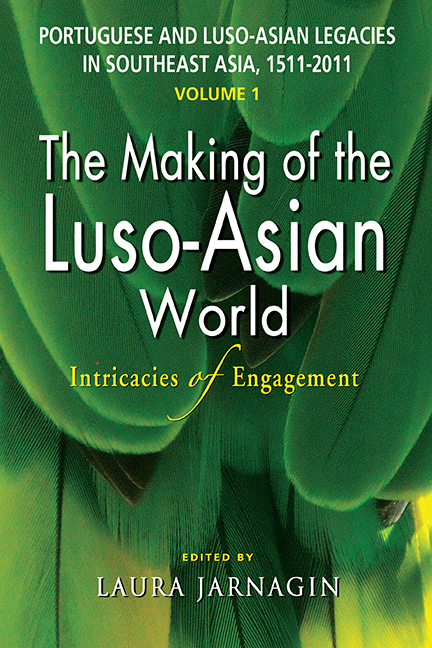 Portuguese and Luso-Asian Legacies in Southeast Asia, 1511–2011, vol. 1
Portuguese and Luso-Asian Legacies in Southeast Asia, 1511–2011, vol. 1 Book contents
- Frontmatter
- Contents
- List of Charts, Figures and Tables
- A Tribute to Glenn Ames
- Preface
- List of Contributors
- Glossary
- Introduction: Towards Clarity through Complexity
- Part One Adaptations and Transitions in the South and Southeast Asian Theatres, Sixteenth through Eighteenth Centuries
- 1 Supplying Simples for the Royal Hospital: An Indo-Portuguese Medicinal Garden in Goa (1520–1830)
- 2 Malacca in the Era of Viceroy Linhares (1629–35)
- 3 From Meliapor to Mylapore, 1662–1749: The Portuguese Presence in São Tomé between the Qutb Shāhī Conquest and Its Incorporation into British Madras
- 4 Eighteenth-Century Diplomatic Relations between Portuguese Macao and Ayutthaya: The 1721 Debt Repayment Embassy from Macao
- 5 Continuities in Bengal's Contact with the Portuguese and Its Legacy: A Community's Future Engangled with the Past
- Part Two Dispersion, Mobility and Demography from the Sixteenth into the Twenty-first Centuries
- Part Three Mixed Legacies: The Portuguese and Luso-Asians in the Twentieth and Twenty-first Centuries
- Bibliography
- Index
1 - Supplying Simples for the Royal Hospital: An Indo-Portuguese Medicinal Garden in Goa (1520–1830)
from Part One - Adaptations and Transitions in the South and Southeast Asian Theatres, Sixteenth through Eighteenth Centuries
Published online by Cambridge University Press: 21 October 2015
- Frontmatter
- Contents
- List of Charts, Figures and Tables
- A Tribute to Glenn Ames
- Preface
- List of Contributors
- Glossary
- Introduction: Towards Clarity through Complexity
- Part One Adaptations and Transitions in the South and Southeast Asian Theatres, Sixteenth through Eighteenth Centuries
- 1 Supplying Simples for the Royal Hospital: An Indo-Portuguese Medicinal Garden in Goa (1520–1830)
- 2 Malacca in the Era of Viceroy Linhares (1629–35)
- 3 From Meliapor to Mylapore, 1662–1749: The Portuguese Presence in São Tomé between the Qutb Shāhī Conquest and Its Incorporation into British Madras
- 4 Eighteenth-Century Diplomatic Relations between Portuguese Macao and Ayutthaya: The 1721 Debt Repayment Embassy from Macao
- 5 Continuities in Bengal's Contact with the Portuguese and Its Legacy: A Community's Future Engangled with the Past
- Part Two Dispersion, Mobility and Demography from the Sixteenth into the Twenty-first Centuries
- Part Three Mixed Legacies: The Portuguese and Luso-Asians in the Twentieth and Twenty-first Centuries
- Bibliography
- Index
Summary
By the mid-seventeenth century, medical practice in the Portuguese-held enclaves of southern India had become thoroughly hybridized, with applied remedies in colonial health institutions relying heavily on indigenous medicinal plants. To ensure a ready supply of common local and imported healing herbs in the administrative hub of the Portuguese Asian empire, the Hospital Real Militar in Goa maintained on its premises a medicinal herb garden, supervised directly by the chief physician of the Estado da Índia.
This chapter will explore the form, function and role of this Portuguese medical garden as a multicultural space within a larger “hybridized” colonial medical sphere, wherein European and South Asian (and, indeed, even African, South American and Chinese) concepts about healing blended. The chapter will describe the physical space of the garden, its Indo-Portuguese caretakers and their unique medical cosmology, and the hospital's intellectual environment, which placed so much value on the indigenous remedies supplied through this garden's bounty. Further, the chapter will describe various medicinal plants cultivated in Indo-Portuguese hospital gardens, their applications and effects, as well as the social context in which the medical practitioners who employed these plants operated.
In view of the horticultural nature of this work, modern usage of the term “hybrid” demands comment. As employed above, the word today has come to mean simply a “mixed” or “blended” product derived from dissimilar components — in this case, to describe a process of shared acculturation unavoidable in a colonial context. In the early seventeenth century, however, the word, newly minted in English and with origins in farming and animal husbandry, had a much more specific connotation, referring to the offspring of two animals of different breeds, species or varieties. Usually the word implied deliberate cross-breeding to obtain beneficial genetic characteristics. “Hybrid” was soon applied in gardening as well as to refer to the crossfertilization of different plants. The word did not achieve wide circulation outside of scientific or agrarian circles until after 1850, when it began to take on its broader current meaning. “Hybrid” will crop up frequently in this chapter, not employed as originally intended but instead in the modern sense, to refer to the unique blended culture found in the Portuguese Indian colonies.
- Type
- Chapter
- Information
- Portuguese and Luso-Asian Legacies in Southeast Asia, 1511–2011, vol. 1The Making of the Luso-Asian World: Intricacies of Engagement, pp. 23 - 47Publisher: ISEAS–Yusof Ishak InstitutePrint publication year: 2011


